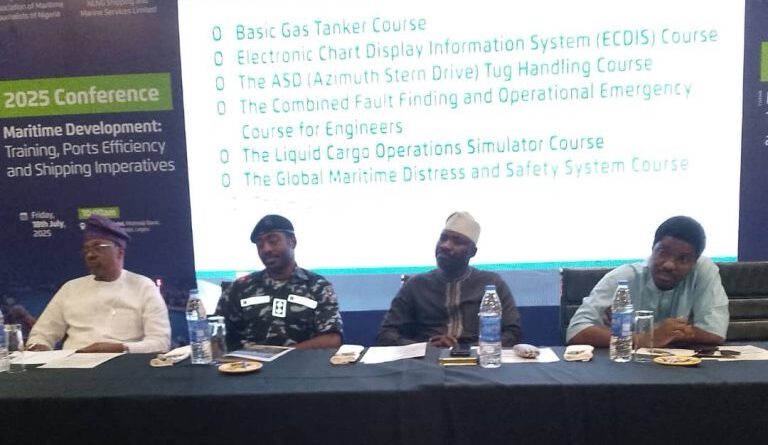Inefficiency of Nigeria’s Global Trade: NSC Clamours for Unified Maritime Regulation to Address Port Fragmentation Costs
By Raheem Ibrahim
In a bid to address national competitiveness threats stemming from inefficiencies, overlapping mandates, and rising logistics costs in Nigeria’s seaport trade, the Nigerian Shippers’ Council (NSC) has called for the establishment of a standardized regulatory framework in the country’s port and maritime sector.
The Executive Secretary/CEO of NSC, Ibrahim Muhammed, revealed that Nigeria’s poor performance in the World Bank’s 2023 Logistics Performance Index (LPI) — ranking 130th out of 139 countries — is largely due to an outdated and fragmented regulatory environment.
Delivering a paper at the 2025 Conference of the Association of Maritime Journalists of Nigeria (AMJON), held in collaboration with NLNG Shipping and Marine Services Limited at the Sheraton Hotel, Ikeja, Lagos, the NSC boss warned that unless Nigeria harmonizes port regulations and embraces digital reforms, the country risks falling further behind in global logistics performance rankings.
Muhammed, who was represented by Pius Akutah, NSC’s Deputy Director of Regulatory Services, alleged that multiple port agencies — including the Nigerian Ports Authority (NPA), Nigerian Maritime Administration and Safety Agency (NIMASA), Nigeria Customs Service, and others — operate in silos, leading to duplicated inspections, delayed cargo clearance, and heightened corruption risks.
He stated, “A functional port is not possible without a unified and transparent regulatory system. Trade cannot thrive in an environment of overlapping commands.”
The NSC cited a 2022 report by the Nigerian Economic Summit Group, which found that 49% of delays at Nigerian ports were due to conflicting agency procedures and manual operations. While some agencies, such as NSC and Customs, have begun digitizing their processes, many still rely heavily on paper-based documentation.
“The United Nations Conference on Trade and Development (UNCTAD) also noted that 70% of African ports face similar delays. However, countries like Ghana, Morocco, and Singapore have successfully reversed this trend by deploying integrated digital systems,” he added.
To resolve the crisis, the Council proposed a seven-point reform strategy:
- Institutional Realignment: Harmonize the roles of NSC, NPA, and Customs to eliminate duplication.
- Digital Integration: Launch a Port Community System (PCS) to connect all stakeholders; expand e-Manifest and cargo tracking platforms.
- Human Capital Development: Continuous training for compliance officers and regulators, in partnership with UNCTAD and the World Bank.
- Stakeholder Engagement: Host quarterly roundtables with shippers, terminal operators, freight forwarders, and exporters.
- Performance Monitoring: Monthly publication of key port performance indicators such as dwell time, clearance time, and compliance scores.
- Dispute Resolution: Establish a Maritime Economic Tribunal to fast-track conflict resolution within 21 days.
- Legislative Reform: Ensure passage of the Nigerian Ports Economic Regulatory Authority (NPERA) Bill, which would empower NSC to enforce standards, regulate tariffs, and foster competition.
“The NPERA Bill, if passed, could reduce regulatory duplication by 40%, lower port charges by up to 20%, and improve investor confidence by 31%,” the Council told delegates.
Case studies from Africa and Asia illustrate viable models for Nigeria to follow:
- Ghana’s ICUMS system boosted revenue by 34% and halved clearance times.
- Morocco’s PortNet reduced transaction times from 16 to 7 days.
- Singapore’s Unified Maritime Authority helped the country top global LPI rankings.
The NSC stressed that Nigeria must urgently align its systems with the African Continental Free Trade Area (AfCFTA) protocols or risk becoming a weak link in the continent’s trade corridor.
In closing, the Council emphasized that maritime regulatory reform is no longer optional but an economic necessity.
“Where regulation is smart and efficient, trade flows. Where it is not, trade chokes,” the Council quoted from UNCTAD’s 2022 Maritime Outlook.
As global trade moves rapidly towards digitization and regional economic blocs gain momentum, Nigeria’s ability to reform its port regulatory framework may well determine its future position in African and global trade.



